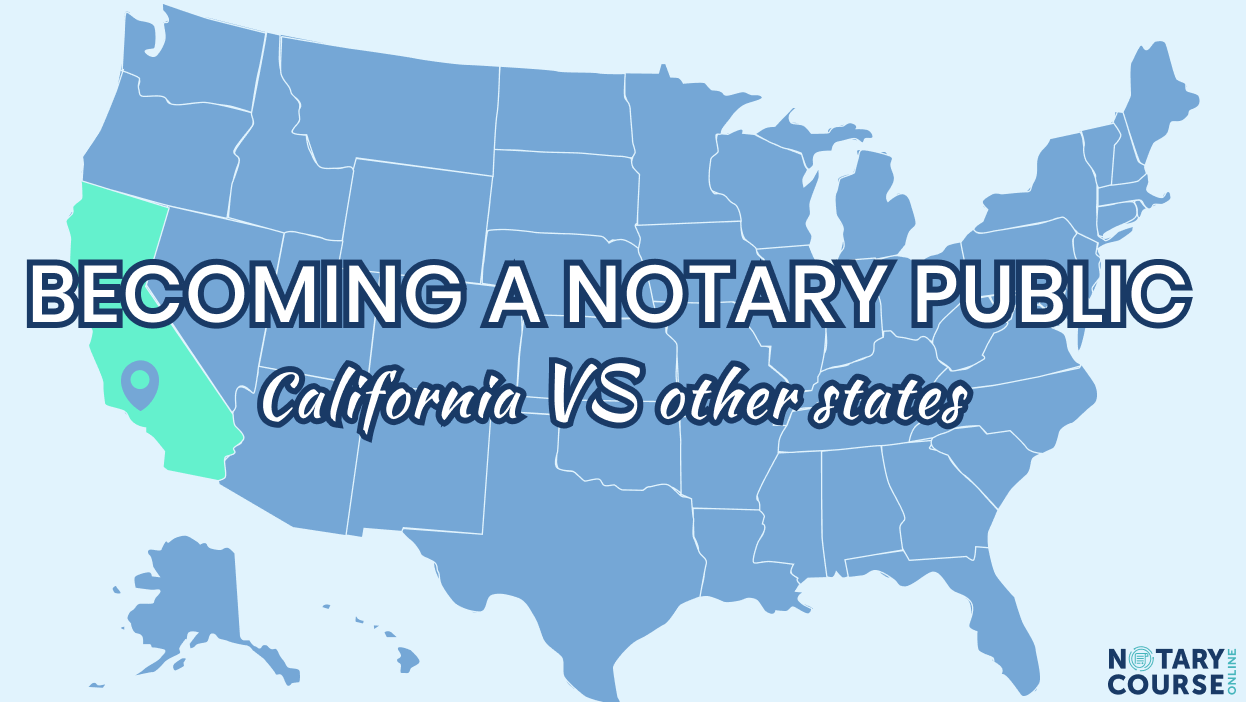California
Blog
Do You Know What’s Involved with Becoming a California Notary?

-
by Notary Course Online
- July 30, 2024
Introduction
A notary public is an official appointed by the state to act as an impartial witness in the signing of important documents. Their primary role involves verifying the identity of signers, ensuring that they are signing willingly and under their own free will, and maintaining accurate records of their notarial acts.
Earning a notary public certification offers several benefits. Many individuals pursue this certification to enhance their career opportunities or create an additional income stream. Others find fulfillment in serving their community by preventing fraud and ensuring the integrity of legal transactions.
To become a California notary public, you must meet specific qualifications and requirements:
- Minimum Age and Residency: You must be at least 18 years old and a resident of California.
- Background Check: Passing an FBI and DOJ background check, including fingerprinting, is mandatory.
- Clean Criminal Record: Applicants must have no felony convictions or disqualifying criminal history.
Maintaining security and preventing fraud are crucial aspects of being a notary public. For instance, using an inkless thumbprint pad can significantly elevate security measures by ensuring clear thumbprints without ink or cleanup, thus further safeguarding against forgery and fraud.
Another essential tool for notaries is the California Notary Journal. This durable and compact journal is designed for frequent use and easy transportation, enabling notaries to maintain accurate records of their notarial acts.
Considering these points will help you understand what’s involved in becoming a notary public in California. For those interested in taking the next step, resources like Renewing Notaries are available to guide you through the process. These courses offer valuable insights and refresher classes designed to keep you updated and compliant with state requirements, making the notary renewal process more manageable.
1. Basic Qualifications for Becoming a California Notary Public
To become a notary public in California, you must meet specific age and residency qualifications:
- Minimum Age: Applicants must be at least 18 years old.
- Residency: You must be a legal resident of California.
Meeting these basic criteria is just the start. The process also includes completing an FBI and DOJ background check, which ensures that only trustworthy individuals are granted the responsibility of being a notary public. This background check involves live scan fingerprinting.
Background Check Process
Live Scan Fingerprinting
- Schedule an appointment with a certified live scan provider.
- Provide your fingerprint samples.
- Pay the associated fees.
FBI and DOJ Review
- Your fingerprints are sent to both the FBI and DOJ for thorough examination.
- They will check for any criminal history.
Ensuring a clean criminal record is crucial. Any felonies or serious misdemeanors can disqualify an applicant from becoming a notary public in California. This stringent screening upholds the integrity of the notarial profession, ensuring that only those with exemplary backgrounds are entrusted with this role.
By meeting these qualifications and passing the background checks, you take the first significant step towards becoming a certified notary public in California.
2. Notary Courses in California
Completing a state-approved notary course is crucial for anyone aspiring to become a notary public in California. This step ensures that you gain the necessary knowledge and skills required to perform your duties effectively.
Options for Taking the Required Course
There are multiple ways to complete the required notary courses:
- Online Course: Ideal for those with busy schedules or residing in remote areas. Online courses provide flexibility, allowing you to study at your own pace while costing less than in-person training.
- In-Person Course: Offers direct interaction with instructors and peers, which can be beneficial for understanding complex concepts. These courses are typically held in various locations throughout California.
Both formats cover the same core material, preparing you comprehensively for the state exam. Choosing between an online or in-person course depends on your personal preferences and logistical considerations.
To further enhance your preparation and maximize your chances of passing the exam on your first attempt, consider exploring our California Notary Practice Test which offers a comprehensive set of practice questions specifically tailored to the California notary exam.
Additionally, it’s important to understand the key benefits of becoming a notary public. These include enhanced career opportunities and active participation in the legal system. To learn more about this, you can visit Why Should You Become a Notary?.
Moreover, meticulous document review is an essential skill for a notary public. To gain more insights on this topic, you may find our article Double Check then Triple Check quite helpful.
Proper preparation through these courses is key to succeeding as a notary public in California.
3. Preparing for the Notary Exam
Scheduling your state notary exam in California is a crucial step. You can register for the exam through the official Secretary of State website, choosing from various dates and locations across the state. Be sure to book your spot early as exams can fill up quickly.
Tips for Success on the Notary Exam
To succeed in the notary exam, consider these strategies:
- Read Instructions Carefully: The instructions are usually found on the first page. Take your time to understand them before diving into the questions.
- Answer All Questions: Even if you’re unsure about a multiple choice question, provide an answer. There’s no penalty for guessing.
- Move On If Stuck: If you find a challenging question, skip it and return to it later. This ensures you maximize your time on questions you can confidently answer.
- Trust Your Instincts: Often, your first choice is correct. Avoid overthinking and second-guessing yourself.
Resources
Using practice tests can be extremely beneficial. CA Notary Practice Exam materials can boost your confidence and knowledge, helping you get familiar with the format and types of questions you’ll encounter.
For added convenience, consider tools like the California Pocket Embosser which meet state requirements and aid in achieving accuracy during your notarial duties.
By following these tips and utilizing available resources, you can enhance your preparation and increase your chances of passing the California notary exam successfully.
4. Understanding the Costs Involved
Becoming a notary in California involves several fees you need to consider:
- Course Training Fees: Depending on the format, these can vary. Online classes typically range from $50, while attending an in-person seminar could cost around $100. The flexibility of online courses often makes them a popular choice.
- State Exam Cost: The fee for taking the state exam is $40. If you need to retake the exam, you’ll incur an additional $20 fee.
- Fingerprinting and Background Check Fees: Completing the required FBI and DOJ background check, including live scan fingerprinting, costs approximately $80.
- Application Fees and Notary Supplies: Once you pass the exam, you’ll need to submit your application and purchase necessary supplies. This includes:
- Application Fee: The application itself may have associated costs.
- Notary Supplies: Items such as a stamp, journal, and fingerprint kit can total between $45 and $109.
- Passport Photo: A 2” by 2” color passport photo usually costs between $10 and $15.
- Oath of Office: Taking the Oath of Office costs between $20 and $40.
For detailed guidance on choosing the right course, you may find this resource useful. It offers insights into selecting state-approved California notary classes that suit your needs.
Additionally, understanding all requirements is crucial; check out this page for comprehensive information on becoming a California notary public. It covers everything from studying for the exam to getting your application approved by the Secretary of State.
Balancing these costs with the potential benefits of becoming a notary can help you make an informed decision about pursuing this certification.
5. Final Steps to Become a Notary Public in California
Being detail-oriented is crucial as a notary public. It’s important to be accurate during notarizations to avoid legal problems and maintain the authenticity of the documents you handle.
Tips for Checking Your Work:
- Double-check Signatures: Verify that all required signatures are present and correctly placed.
- Review Document Details: Confirm that dates, names, and other critical information are accurate.
- Ensure Proper Stamping: Make sure your notary stamp is clear and correctly positioned.
It’s essential to trust your instincts when performing notarizations. In many cases, your initial judgment is correct. Overthinking or doubting yourself can lead to mistakes.
The process of becoming a notary in California involves several steps, each contributing to your preparedness for the responsibilities ahead. From completing courses and passing exams to understanding legal requirements, every stage helps you develop the attention to detail required for this role.
For example, it’s crucial to familiarize yourself with the Notary FAQ which provides answers to frequently asked questions about California notary public classes, qualifications, and types of online courses. Additionally, you can explore a comprehensive guide on How To Become a Notary Public in California: 7 Steps which delves into detailed instructions on the entire process.
Becoming a notary in California not only improves your professional abilities but also allows you to serve the community effectively. The responsibilities may be significant, but the satisfaction of being diligent and accurate is equally rewarding. If you have any concerns about privacy throughout this process, please refer to their Privacy Policy.
Conclusion
Taking the steps to meet the requirements for becoming a California notary public can open doors to numerous benefits and opportunities. A notary public plays a crucial role in verifying the authenticity of important documents, contributing to public trust and legal integrity. Whether you’re looking to enhance your career or earn extra income, becoming a notary can be a rewarding path.
To support your journey, various resources are available:
- Explore Notary Public Resources that offer valuable tools such as the Notary Application, Notary Public Handbook, and Notary Public Newsletter.
- For those ready to start their training, comprehensive courses are available.
- To ensure exam success, consult The Ultimate Guide to the California Notary Exam 2023.
With determination and access to these resources, you can confidently navigate how to become a California notary. Embrace the opportunity to serve your community and advance your professional goals.
FAQs (Frequently Asked Questions)
What are the options for taking the required notary course in California?
There are different options for taking the required notary course in California, including state-approved online courses or in-person classes.
What should I expect when preparing for the Notary Exam in California?
When preparing for the Notary Exam in California, candidates should expect to schedule the exam and focus on practical details. Useful tips and strategies will be provided to help candidates succeed, with a focus on answering multiple choice questions effectively.
What are the costs involved in becoming a Notary Public in California?
The costs involved in becoming a Notary Public in California include various fees such as course training fees, exam fees, and application fees. It is important to understand the breakdown of these fees before pursuing certification.
Why is it important to check work carefully during notarizations?
It is important to check work carefully during notarizations to ensure thoroughness and attention to detail. This is essential in fulfilling the responsibilities of a Notary Public.
What are the final steps to become a Notary Public in California?
The final steps to become a Notary Public in California involve emphasizing thoroughness and attention to detail, trusting one's instincts, and understanding the responsibilities that come with the role.






 Congratulations!
Congratulations!